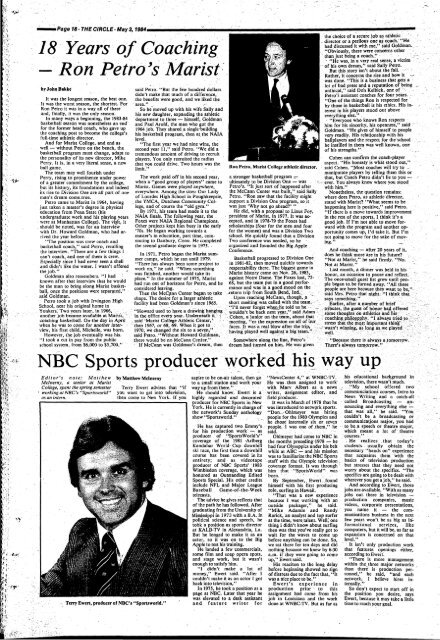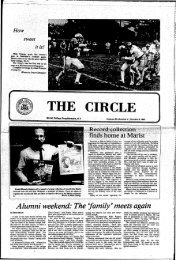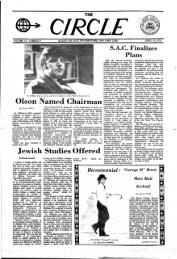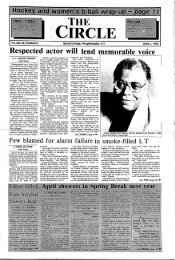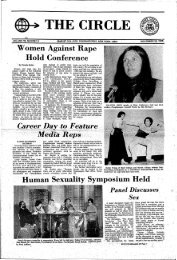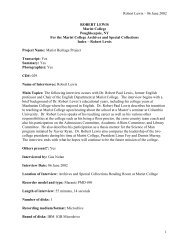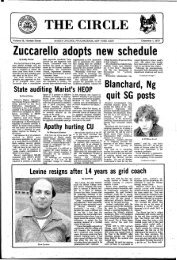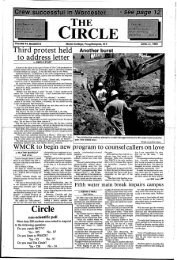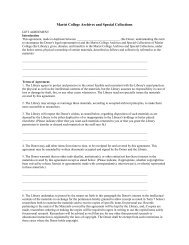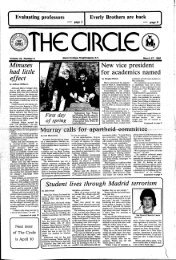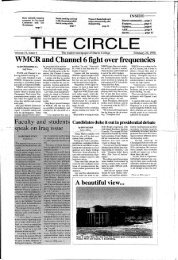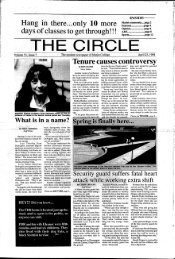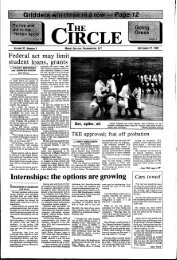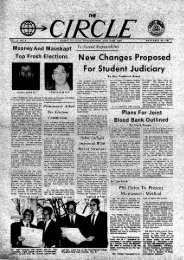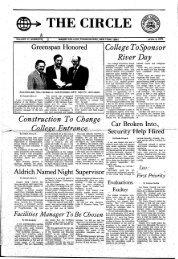Vol. 29 No. 20, May 3, 1984 - James A. Cannavino Library - Marist ...
Vol. 29 No. 20, May 3, 1984 - James A. Cannavino Library - Marist ...
Vol. 29 No. 20, May 3, 1984 - James A. Cannavino Library - Marist ...
You also want an ePaper? Increase the reach of your titles
YUMPU automatically turns print PDFs into web optimized ePapers that Google loves.
• Page 18 • THE CIRCLE • <strong>May</strong> 3,<strong>1984</strong> •18 Years of Coaching— Ron Petro 's <strong>Marist</strong>the choice of a secure job as athleticdirector or a perilous one as coach. "Hehad discussed it with me," said Goldman."Obviously, there were concerns otherthan just being a coach."'•.•- "He was, in a very real sense, a victimof his own dream," said Sally Petro.But this story isn't about the fall.Rather, it concerns the rise and how it. —-was done. "This is a business that gets alot of bad press and a reputation of beingurithical," said Don Kelbick, one of"Petro's assistant coaches for four years."One of the things Ron is respected for 'by those in basketball is his ethics. His interestin his players stood out aboveeverything else.""Everyone who knows Ron respectshim for his sincerity, his openness," saidGoldman. "He gives of himself to peoplevery readily. His relationship with hisballplayers and the respect for the schoolhe instilled in them was well known, oneof his strengths."Cohen can confirm the coach-playeraspect. "His honesty is what stood out,"said Cohen. "Most coaches will try to .maniputate players by telling them this orthat, but Coach Petro didn't lie to you —ever. You always knew where you stoodwith him."<strong>No</strong>netheless, the question remains:where does Petro, as athletic director,stand with <strong>Marist</strong>? "What seems to behappening here is positive," said Petro."If there is a move towards improvementin the rest of the sports, I think it's agood job. If I'm hot able to move forwardwith the program and another opportunitycomes up, I'd take it. But I'mnot going to move for the sake of moving."—by John Bakkesaid Petro. "But the few hundred dollarsdidn't make that much of a difference,It was the longest season, the best one. the benefits were good, and we liked theIt was the worst season, the shortest. For area." ....Ron Petro it was in a way all of these So he moved up with his wife Sally andand, filially, it was the only season. his new daughter, expanding the athleticIn many ways a beginning, the 1983-84 department to three — himself, Goldmanbasketball season was nonetheless an end' and Paul Arold, the man who got thefor the former head coach, who gave up 1964 job. They shared a single buildingthe coaching post to become the college's his basketball program, then at the NAIAfull-time athletic director.level.And for <strong>Marist</strong> College, and end as "The first year we had nine wins, thewell — without Petro on the bench, the second year 11," said Petro. "We did abasketball program must change, adapt to tremendous amount of driving to recruitthe personality of its new director, Mike players. You only recruited the radiusPerry. It is, in a very literal sense, a new that you could drive. Two hours was theball game.limit." ,-.Ron Petro, <strong>Marist</strong> College athletic director.The team may well fourish underPerry, rising to prominence under power The work paid off in his second year, a stronger basketball program —of a greater commitment by the college, when a "good group of players" came to ultimately to be Division One — wasbut its history, its foundations and indeed <strong>Marist</strong>. Games were played anywhere, Petro's. "It just sort of happened afterits rise to Division One are all part of one everywhere. Among the sites: Our Lady the McCann Center was built," said Sallyman's dream come.true.of Lourdes High School in Poughkeepsie, Petro. "Ron saw that the facility mightPetro came to <strong>Marist</strong> in 1964, having the YMCA, Dutchess Community College,and of course the "old gym." was just 'Why not go ahead?' "support a Division One program, so .itjust taken a master's degree in physicaleducation from Penn State (hisBy 1971, his team had made it to the He did, with a proposal to Linus Foy,undergraduate work and his playing years NAIA finals. The following year, the president of <strong>Marist</strong>, in 1977. It was accepted,and in 1978-79 the Foxes hadwere at Manhattan College). The visit, it Foxes were NAIA Regional Champions.should be noted, was for an interview Other projects kept him busy in the early scholarships (four for the men and fourwith Dr. Howard Goldman, who had arrivedthe year before.master's in education, part time, comschool. He quickly found that a Division'70s. He began working towards a for the women) and was a Division Two"The position was crew coach and muting to Danbury, Conn. He completed Two conference was needed, so hebasketball coach," said Petro, recalling the second graduate degree in 1975. < organized and founded the Big Applethe interview. "There are a few things IConference.can't coach, and one of them is crew.In 1971, Petro began the <strong>Marist</strong> summercamps, which he ran until 1979. Basketball progressed to Division OneEspecially since I had never seen a shelland didn't like the water. I wasn't offered"There has always been some project to in 1981-82, then moved quickly towardsthe job."-'work on," he said. "When something respectability there. The biggest game inwas finished, another would take its <strong>Marist</strong> history came on <strong>No</strong>v. 26,-1983,Goldman also remembers. "I had •place." In the summer of 1975, <strong>Marist</strong> against <strong>No</strong>tre Dame. The Foxes lost, 75-known after that interview that he wouldhad run out of horizons for Petro, and he 68, but the team put in a good performanceand was in a good mood on thebe the man to bring along <strong>Marist</strong> basketball,once the positions were separated,"considered leaving.Then the McCann Center began to take ..return trip from South Bend, Ind.said Goldman.shape. The desire for a larger athletic Upon reaching McCann, though, aPetro took a job with Irvington Highfacility had been Goldman's since 1965. short meeting was called with the team.School, near his original home in"I'll never forget whenjte told us heYonkersl Two years later, in 1966, "Howard used to have a drawing hanging wouldn't be back next year," said Adamanother job became available at <strong>Marist</strong>, in the office every year. Underneath it ,s - Cohen, a junior on the team, about thatcoaching basketball. On the day in April said '<strong>Marist</strong> College Athletic Center,? meeting, "or the expression on all of ourwhen he was to come for another interview,his first child, Michelle, was born. 1970, we changed the six to a seven," having played well against a big team."then 1967, or 68,69. When it got to faces. It was a real blow after the trip,However, the job eventually was his. said Petro. "Without Howard Goldman,"I took a cut in pay from the public there would be no McCann Center." Somewhere along the line, Petro'sschool system, from $6,000 to $5,700," If McCann was Goldman's dream, then dream had turned on him. He was givenNBC Sports producer worked his way upEditor's note: MatthewMclnerny, a senior at <strong>Marist</strong>College, spent the spring semesterworking at NBC's "Sportsworld"as an intern.by Matthew MclnernyTerry Ewert advises that "ifyou want to get into television,then come to New York. If youTerry Ewert, producer of NBC's "Sportsworld."aspire to be on-air talent, then goto a small station and work yourway up from'there." .He should know. Ewert is ahighly regarded and decoratedproducer for NBC Sports in NewYork. He is currently in charge ofthe network's Sunday anthologyshow "Sportsworld."He has captured two Emmy'sfor his production work" — asproducer of "SportsWorld's"coverage of the 1981 -ArlbergKandahar World Cup downhillski race, the first time a downhillcourse has been covered in itsentirety; and as videotapeproducer of NBC Sports' 1983Wimbledon coverage, which washonored as Outstanding EditedSports Special. His other creditsinclude NFL and Major LeagueBaseball Game-of-the-Weektelecasts.The advice he gives reflects thatof the path he has followed. Aftergraduating from the University ofMississippi in 1973 with a B.A. inpolitical science and speech, hetook a position as sports directorat KALB-TV in Alexandria, La.But he longed to make it as anactor, so it was on to the BigApple to test his training.He landed a few commercials,some film and soap opera spots,and stage work, but it wasn'tenough to satisfy him."I didn't make a lot ofmoney," Ewert said. "After Icouldn't make it as an actor I gotback into television,"In 1975, he took a position as apage at NBC. Later that year hewas elevated to a desk assistantand feature writer for"NewsCenter 4," at WNBC-TV.He was then assigned to work"with Marv Albert as a news,writer, assignment editor, andfield producer.It was in March of 1978 that hewas introduced to network sports."Don,- Ohlmeyer was hiringpeople for the 1980 Olympics andhe chose internally six or sevenpeople. I was one of them," hesaid. v ••..'.;.-•• -Ohlmeyer had come to NBC inthe months preceding4978 — hehad four Olymppics under his beltwhile at ABC — and his missionwas to familiarize the NBC Sportsstaff with the Olympic television;coverage format. It was throughhim that "SportsWorld" wasborn.By September,. Ewert. foundhimself with his first producingrole, surfing in Hawaii."That was a new experiencebecause I was working with anoutside packager," he said."Mike Adamle and RandyRarick, an analyst and top surferat the time, were talent. Well,' onething I didn't know about surfingthen was that you've really got towait for the waves to come upbefore anything can be done. So,we sat there for ten days and didnothing because we knew by 6:30a.m. if they were going to comeup," Ewert said.His reaciton to the long delaybefore beginning showed no signof distress due to the fact that, "Itwas a nice place to be."Ewert's experience inproduction prior to thisassignment had come from hisjob in Louisiana and the workdone at WNBC-TV. But as far asAnd coaching — after <strong>20</strong> years of it,does he think more are in his future?"<strong>No</strong>t at <strong>Marist</strong>," he said firmly. "<strong>No</strong>. ;<strong>No</strong>t at <strong>Marist</strong>."Last month, a dinner was held in hishonor, ah occasion to pause and reflect;The once-small guest list grew until peoplebegan to be turned away. "All thesepeople are here because they want to be,"said Mrs. Petro that night. "I think thatsays something."Earlier, after a number of brieftributes, the guest of honor hadjjfferedsome thoughts on athletics and hiscoaching philosophy. "I always tried tostress that the most important thing"wasn't winning, as long as we played .well."Because there is always a,tomorrow.There's always tomorrow."his educational background intelevision, there wasn't much."My school offered twocommunciations courses, Intro toNews Writing and a catch-allcalled Broadcasting — announcingand everything else —that was all," he said. "Youcouldn't be a broadcasting orcommunications major, you hadto be,a speech or theatre major,which meant a lot of theatrecourses."- He realizes . that today'sstudents-. usually obtain thenecessary "hands on" experiencethat acquaints them "with thebasics of television productionbut stresses that they need notworry about the specifics. "Thespecifics are going to be dealt withwherever you get a job," he said.And according to Ewert, thosejobs are available. "With as manyjobs out there in television —production companies, musicvideos, corporate presentations,you name it — the communicationsbusiness in the nextfew years won't be as big as informationalservices, likecomputers, but it will be, as far asexpansion is concerned on thatlevel."It isn't only production workthat features openings either,according to Ewert."There is more managementwithin the three major networksthan there is production personnel,"he said, "and eachnetwork, I believe hires internally."So don't expect to start off inthe position you desire, saysEwert, because it may take a littletime to reach your goal.<strong>No</strong>rth end acreagepresents problemsby Thorn CrosierHow do you turn seven acres ofhills, treees, abandoned caterpillartractors, and amusementpark rubble into usable athleticfields, and stay within a small,private college's budget? That's aquestion the college administrationwill soon have toanswer.The plans for putting in a stillundeterminednumber and type ofathletic fields has run into landscapingand financial'problems.The property, which is located onthe north end of campus approximately50 yards behind thetownhouses, was donated to<strong>Marist</strong> by an individual whosename has not yet been madepublic.Athletic Director Ron Pe* r ~saw the area for the first time lastweek and said that to him itwould take a "substantial effortto get it into good shape." Petrosaid that the.seven acres looksgreat on paper but the topographyof the land will make it financiallydifficult to cope with. It is Petro'sresponsibility to suggest the typeof fields that should go into thearea.<strong>Marist</strong> Vice President forAdministration and FianceEdward P. Waters, who is also amember of the Building andGrounds Committee that is nowdiscussing the athletic fields, saidthat there are other things thatneed immediate attention.The addition of <strong>Marist</strong> Eastand the building of the LowellThomas Center pushes theengineering of the fields down thepriority list. Waters said that thecollege doesn't have the money todo it right "how and that "all wecan do is make the plans and lookfor the opportunity."Because of the topographicaland financial problems, bothPetro and Waters said they do notknow when work on the fieldswill begin, but said they hoped forcompletion by the beginning ofthe fall semester.First-period action of last week's <strong>Marist</strong>-Dowling game.(photo by John Bakke)Lacrosse——Continued from page <strong>20</strong>minds as they grabbed an early 2-0 lead. Stevens tied the score at 2-2, but that was all she wrote forthe conference leaders. Seven.straight goals, including five byMcNeill, gave <strong>Marist</strong> an insurmountable9-2 advantage. Stevensmanaged to narrow the gap to 10-6 by halftime, but Lettera wasn'tabout to let them come back.Lettera was brilliant in thefourth quarter, stifling Stevenstime after time as <strong>Marist</strong> coastedto a 15-8 win. He had 22 savesoverall.."Today the difference was ourfast break," said McNeill. "Theydidn't know how to handle it.This was a really big win for us."Next year <strong>Marist</strong> will loseseniors McNeill, Loughlin,leading goal-scorer Dave Naar,Charlie Downey, John Petacchiand Tim Gaffney. However,freshman scoring sensation DanArnold will be back, along withgoalie Lettera, a sophomore.A win against Southamptonwould give <strong>Marist</strong> a .500 recordfor the '84 season, a marked improvementover the 3-7 recordposted a year ago. <strong>Marist</strong> headcoach Mike Malet may be astrong candidate for coach-ofthe-yearin the conference.,<strong>May</strong> 3,<strong>1984</strong> - THE CIRCLE - Page 191Thursday Morning QuarterbackJohn BakkeThursday Morning EpilogueAt the" end of just aboutanything, somebody invariablywants to stop and look back,reflect on what's transpired inwhatever period of time is beingconsidered. New Year's is greatfor this; every December we get areview of the year in films, music,sports, politics, stamp collecting,etc., etc. Some of these reviewsare worth doing, others are not.Some are entertaining, others arenot.The same applies to schoolyears. This is about as appropriateand convenient a timeto look back on what's takenplace since September as everthere is going to be. However, if Iwere to relate what I saw as thehighlights of 1983-84, it wouldprobably be one of those reviewsneither entertaining nor worthdoing.Another sentiment insists thatsince I have written 19 ThursdayMorning Quarterback columns, Ican do what I like with this, thelast one of the year. So I will.There are a few final points Iwould like to make,'and this maybe my last chance at them.I've often wondered what it iswith sports. There is somethingabout them — by this I meanorganized, spectator sports —something that captures ourattention, keeps us interested inthese recurring events of intensetriviality.After all, let's look at them fora moment, using a few sportsnative to <strong>Marist</strong>. Watching abasketball game entails, basically,waiting nearly two hours to seewhich group of athletes will throwthe ball through its hoop the mosttimes. For soccer, they kick thebalUnto a goal. And.the footballteam tries to move its ball pastmidfield. <strong>May</strong>be it's the end zone.In any case, how can we, get allworked up over this? (Somepeople, it is said, truly don't careabout any sport. But chances aregood that none of them arereading this, so I can just ignorethem the way I usually do.) Whatis the allure of spectator sports,especially on the college andprofessional levels?First of all, sports are entertainmentand as such offer asort of drama unlike theater,music, or film. Every game ormatch is unrehearsed. The eventcan never be spoiled by knowingthe outcome before it starts. It isall new, all improvisation, differentevery time. True and realsuspense. (Unless you were at lastyear's Albany State footballgame, when a 41-0 halftime scorespoiled the suspense somewhat.)<strong>No</strong>w for the self-servingportion of this column, and mythoughts on the year covering<strong>Marist</strong> athletics. Most of youprobably don't care about this,but others have read the columnand the sports section all year andhave had some strong opinionsabout them — both good andbad. To these people, I'd like toaddress a few finai words on howI tried to do things.First of all, to those faithfulreaders, my thanks. It'sanybody's guess how many ofyou there are (or were), and I'llnever know for sure. But getting alittle feedback (even from a fewbig, sweaty, irate football players)tells me that somebody's reading.It was an interesting yearbehind the scenes, with RonPetro's resignation as basketballcoach and the ensuing search fora replacement. And it was quite.an experience covering the wholestory. Given its limitations, theCircle did a good job covering it.1 think.But there are always doubts.With all the backstage dealings,how much, if any, should be putin The Circle? What do you, the<strong>Marist</strong> community, have the rightto know or need to know aboutthis or any other similar story? Imaintain — and hard-nosedjournalists may disagree — thatthere's not necessarily any reasonto publish something just becauseI've found out about it, even ifit's a good piece of information.So, while I've been a littlesatirical at times, there have beensome things that-you haven't readhere, and won't read here* now:When Petro really found out hewas through as coach, forexample, or the general terms ofMike Perry's contract. And otherstories that I held off on for goodreasons.Somebody else, somebody witha crusading journalist attitude,might have printed them. Butwith that reputation, he probablywouldn't have gotten the storiesin the first place. In any case,that's how I tried to do things,and I think it worked well.It was a good year, and I had agood time trying to cover it foryou. It'll be a long time before Iforget asking all of you for sometoilet paper thrown against Siena,then getting literally hundreds ofrolls in response.But all things must end, and soit is here. I'll be taking a senioreditor position next year, with IanO'Connor filling the sports editorspot. Actually, I was forced toresign as sports editor, then wehad this big search, with acommittee and all, for myreplacement...... but you don't want to hearabout that again.Two recruits sign with Foxesby <strong>James</strong> <strong>No</strong>rmanThe recruiting wars grind on asthe <strong>Marist</strong> College men'sbasketball team attempts to bringnew talent to the campus nextseason.New Head Coach Mike Perryhas landed two of his prizerecruits, will have another ifFrance lets him, and still awaitsword on The Big Guy.The first big catch was OnteoraHigh School's Ken Galloway.Galloway is an honor student aswell as an outstanding basketballplayer."I'm delighted to have a realstudent-athlete," Perry saidbefore leaving for Paris, France,last month. "He's exactly whatwe want."Galloway is a 6-5 shootingguard who sports some prettyimposing stats while leadingOnteora to a 17-6 record last year.Check out these numbers: 25points per game, 13.5 rebounds,5.5 assists and 3.4 steals. He shot53 percent from the field and 77percent from the line. His namefrequents the Onteora recordbook, as he holds the school'sscoring record for a game (44),season (555), and career (1,593).TennisContinued from page <strong>20</strong>washed out the decision. <strong>Marist</strong>was also leading in two matcheswhich were being played at thetime.Breen said that the team shouldbe strong next year if the currentgroup of freshmen return. "Thisyear I got a lot more than I expectedfrom the team," saidBreen. "These kids come to play,and given a year of experience weshould be tough next year."By pursuing Galloway, Perryshowed a willingness to recruitarea players. "I think anyDivision One prospect in theHudson Valley must be recruitedby <strong>Marist</strong> College." Gallowaywill certainly fill the bill if he canduplicate his high school numbersat <strong>Marist</strong>.Mike Fielder, a 6-4 forwardfrom Mater Dei High School inSanta Ana, California, was thesecond signee for Perry.Although he averaged only eightpoints and six rebounds a gamehis senior year, the statistics don'ttell the whole story.His high school coach, GaryMcKnight, described him as "afine defender and hustling playerwho really makes things happen."Fielder is just the type ofplayer to fit in with Perry'srunning, trapping style ofbasketball.The signings of Galloway andFielder were announced,one dayapart on April 18 and 19.6-5 Christian Gamier is ready,willing, and able to traveloversears to play for the Foxes.The problem is, French officialswon't let him. Gamier, whoplayed on Perry's Stade Francais-Paris team last year, expressed awillingness to come to the statesto play for <strong>Marist</strong>, but thepowers-that-be in France haveother ideas. The concern is thatFireContinued from page 3occupied until a suitable alarmsystem was installed. While hesaid the sprinkler system in thebuilding does protect the occupants,he also said, "We haveno way of knowing (when) there'sChristian GamierGamier would be coming to theUnited States to play basketballonly, and educatio'n would beforgotten. It's up to Perry toconvince them otherwise.After failing to land prizeprospect Gunther Behncke, Perryhas set his sights on another bigman from overseas. Behncke, a 7-4 German player, signed a letterof intent to play for theUniversity of Kentucky.As a result, Perry has beentrying to persuade another one ofhis former French players, 6-11Eric Fleury, to come to <strong>Marist</strong>.Fieury has narrowed his choicesto <strong>Marist</strong> and the Foxes' archrival,Siena. He expects to makehis decision in June.an alarm there."Town Supervisor AnneBuchholz said she has not beencontacted by Dormeyer. "ChiefDormeyer has not expressed hisconcern to the Town Board," shesaid. "I wish he'd tell us what hewants.".


